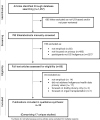A systematic literature review of Native American and Pacific Islanders' perspectives on health data privacy in the United States
- PMID: 33063114
- PMCID: PMC7727344
- DOI: 10.1093/jamia/ocaa235
A systematic literature review of Native American and Pacific Islanders' perspectives on health data privacy in the United States
Abstract
Background: Privacy-related concerns can prevent equitable participation in health research by US Indigenous communities. However, studies focused on these communities' views regarding health data privacy, including systematic reviews, are lacking.
Methods: We conducted a systematic literature review analyzing empirical, US-based studies involving American Indian/Alaska Native (AI/AN) and Native Hawaiian or other Pacific Islander (NHPI) perspectives on health data privacy, which we define as the practice of maintaining the security and confidentiality of an individual's personal health records and/or biological samples (including data derived from biological specimens, such as personal genetic information), as well as the secure and approved use of those data.
Results: Twenty-one studies involving 3234 AI/AN and NHPI participants were eligible for review. The results of this review suggest that concerns about the privacy of health data are both prevalent and complex in AI/AN and NHPI communities. Many respondents raised concerns about the potential for misuse of their health data, including discrimination or stigma, confidentiality breaches, and undesirable or unknown uses of biological specimens.
Conclusions: Participants cited a variety of individual and community-level concerns about the privacy of their health data, and indicated that these deter their willingness to participate in health research. Future investigations should explore in more depth which health data privacy concerns are most salient to specific AI/AN and NHPI communities, and identify the practices that will make the collection and use of health data more trustworthy and transparent for participants.
Keywords: Indigenous populations; health information; personal genetic information, research ethics; privacy.
© The Author(s) 2020. Published by Oxford University Press on behalf of the American Medical Informatics Association.
Figures
Similar articles
-
Incidence of ESKD Among Native Hawaiians and Pacific Islanders Living in the 50 US States and Pacific Island Territories.Am J Kidney Dis. 2020 Sep;76(3):340-349.e1. doi: 10.1053/j.ajkd.2020.01.008. Epub 2020 May 5. Am J Kidney Dis. 2020. PMID: 32387021
-
A systematic literature review of individuals' perspectives on privacy and genetic information in the United States.PLoS One. 2018 Oct 31;13(10):e0204417. doi: 10.1371/journal.pone.0204417. eCollection 2018. PLoS One. 2018. PMID: 30379944 Free PMC article.
-
Democratizing Native Hawaiian and Pacific Islander Data: Examining Community Accessibility of Data for Health and the Social Drivers of Health.Am J Public Health. 2024 Jan;114(S1):S103-S111. doi: 10.2105/AJPH.2023.307503. Am J Public Health. 2024. PMID: 38207270 Free PMC article.
-
Food Security Status of Native Hawaiians and Pacific Islanders in the US: Analysis of a National Survey.J Nutr Educ Behav. 2020 Aug;52(8):788-795. doi: 10.1016/j.jneb.2020.01.009. Epub 2020 Mar 14. J Nutr Educ Behav. 2020. PMID: 32184077 Free PMC article.
-
Best Practices for Community-Engaged Research with Pacific Islander Communities in the US and USAPI: A Scoping Review.J Health Care Poor Underserved. 2019;30(4):1302-1330. doi: 10.1353/hpu.2019.0101. J Health Care Poor Underserved. 2019. PMID: 31680100 Free PMC article.
Cited by
-
The commercialization of biospecimens from Indigenous Peoples: A scoping review of benefit-sharing.Front Med (Lausanne). 2022 Aug 4;9:978826. doi: 10.3389/fmed.2022.978826. eCollection 2022. Front Med (Lausanne). 2022. PMID: 35991662 Free PMC article.
-
Using Indigenous Standards to Implement the CARE Principles: Setting Expectations through Tribal Research Codes.Front Genet. 2022 Mar 21;13:823309. doi: 10.3389/fgene.2022.823309. eCollection 2022. Front Genet. 2022. PMID: 35386282 Free PMC article.
-
Planning for your CANOE (Circumspect Awareness and Navigation of Outcomes and Expectations) journey in community-engaged research with Indigenous communities.Lancet Glob Health. 2025 Sep;13(9):e1642-e1647. doi: 10.1016/S2214-109X(25)00262-1. Lancet Glob Health. 2025. PMID: 40845889 Free PMC article. Review.
-
Unveiling the shadows: Beyond the hype of AI in education.Heliyon. 2024 May 3;10(9):e30696. doi: 10.1016/j.heliyon.2024.e30696. eCollection 2024 May 15. Heliyon. 2024. PMID: 38737255 Free PMC article.
-
Determining the connectivity of tribal communities to wastewater treatment facilities for use in environmental contamination and exposure assessments by wastewater-based surveillance.J Expo Sci Environ Epidemiol. 2024 May;34(3):424-431. doi: 10.1038/s41370-023-00612-3. Epub 2024 Jan 24. J Expo Sci Environ Epidemiol. 2024. PMID: 38267618
References
-
- Garrison NA, Hudson M, Ballantyne LL, et al. Genomic research through an indigenous lens: understanding the expectations. Annu Rev Genom Hum Genet 2019; 20 (1): 495–517. - PubMed
-
- Cavalli-Sforza LL, A.C W, Cantor CR, Cook-Deegan RM, King MC.. Call for a worldwide survey of human genetic diversity: a vanishing opportunity for the Human Genome Project. Genomics 1991; 11 (2): 490–1. - PubMed
-
- Harry D. The Human Genome Diversity Project: implications for indigenous peoples. Abya Yala News 1994; 8 (4): 13–5. - PubMed





